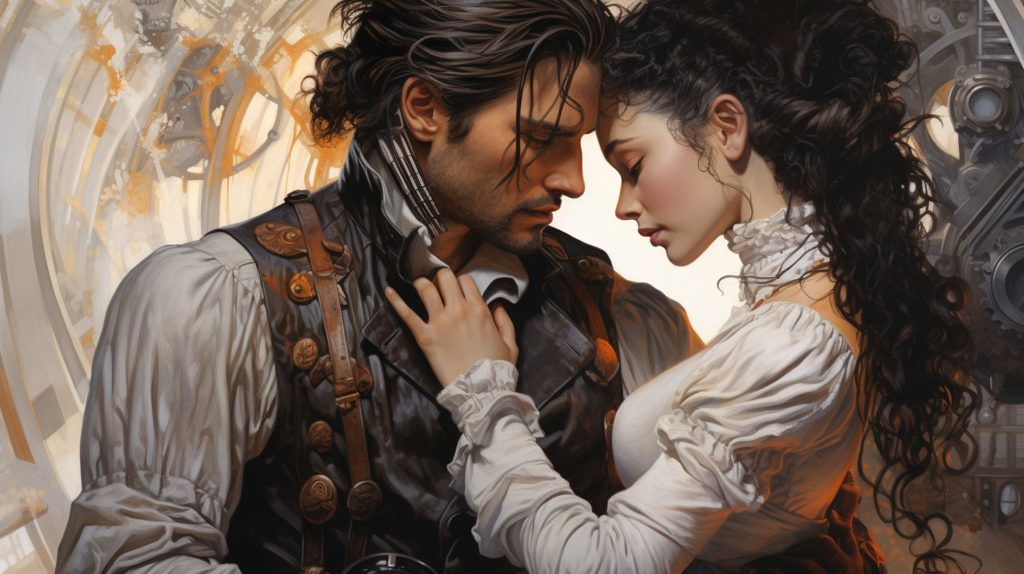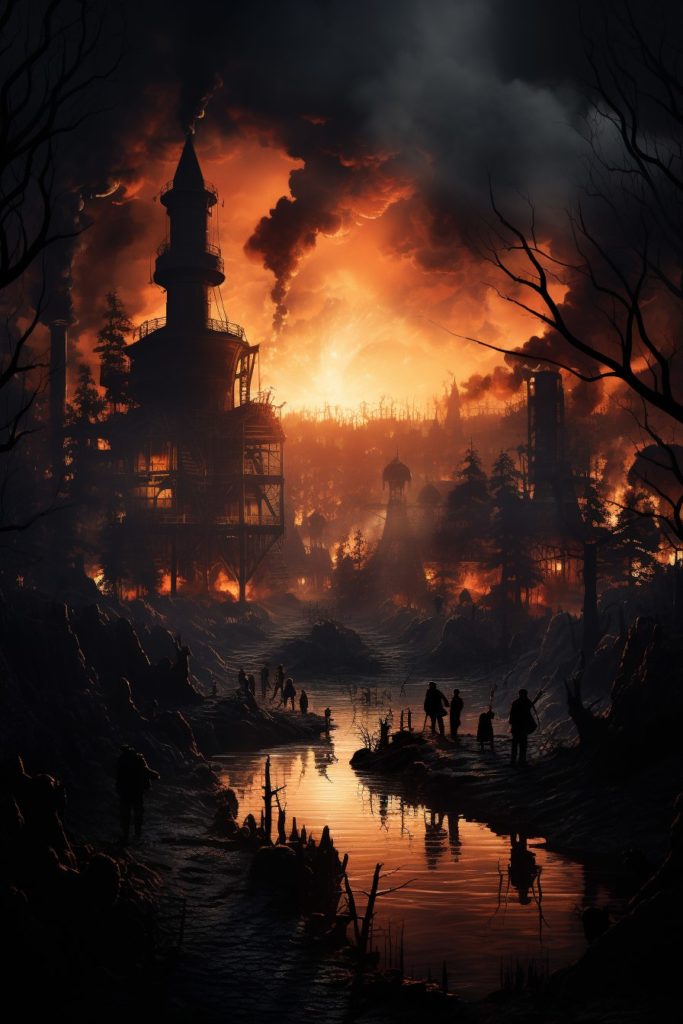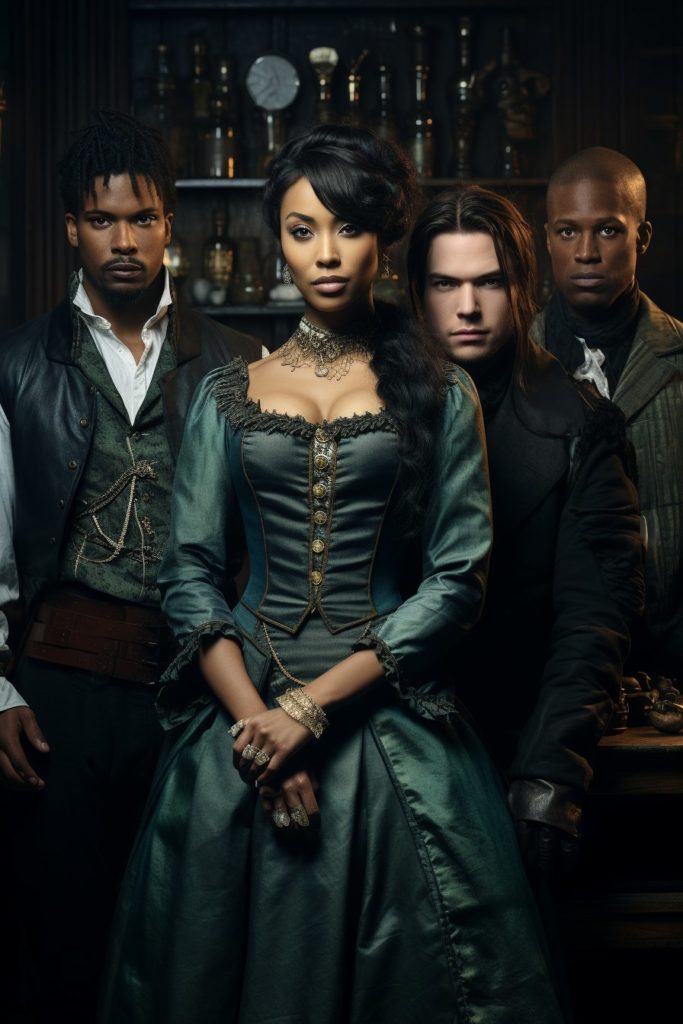
The steampunk genre, a fusion of Victirian-era history and futurism, presents not only thrilling adventures but serves as a mirror reflecting our modern world. This is the case with all science fiction, fantasy, and horror, but as an author of steampunk westerns, I’m especially interested in exploring current issues through a steampunk lens. What makes steampunk a rich medium for exploring contemporary issues? Let’s unearth the layers that make this genre a mirror reflecting today’s society.
Call it Steampunk, or Retro Futurism

Steampunk creates colorful worlds where we imagine what the past would have been like with advanced technology. We also call this “retro-futurism,” in other words, imagining a futuristic past. This provides a foundation to explore where our society could be heading. By using a mix of history and imagination to look at our world from a different angle, it gives us a chance to rethink the choices we are making today. It can serve as an optimistic look at what we could accomplish, or serve as a warning. The comparison between the past and present encourages readers to think more deeply about modern society.
A Critique of Modern Technological Dependence
While we rely heavily on technology today, steampunk challenges this deep connection by showcasing a world run on steam power and clever machinery. Authors can raise real questions about our current dependence on digital tools. Steampunk invites us to think about how humans and machines can work together harmoniously, drawing inspiration from imaginary inventions. Essentially, steampunk opens up a conversation about our current tech habits, encouraging us to critically assess the choices we’ve made and to consider different, potentially better, paths forward.
Gender Roles and Equality

Steampunk goes beyond its characteristic old-fashioned machinery and explores deep-seated issues around traditional gender roles, similar to those from Victorian times. Female heroes break free from old-fashioned expectations, bringing a modern viewpoint to the forefront. Steampunk authors often write about empowerment and equality, and not just as ideas, but sas lived experiences of the characters, offering a strong message of gender equality.
Environmental Concerns
 Steampunk fiction can also reflect how we treat the environment. It’s short stories and novels take us back to a time of rapid industrial growth, showing the serious environmental problems that can come from letting industries grow without control in stories that stress the importance of taking care of our environment through sustainable habits. It encourages us to think about the negative effects of not protecting our natural surroundings today. By looking at a period affected by the early negative impacts of industrialization, we can become more aware of the need to embrace green practices now.
Steampunk fiction can also reflect how we treat the environment. It’s short stories and novels take us back to a time of rapid industrial growth, showing the serious environmental problems that can come from letting industries grow without control in stories that stress the importance of taking care of our environment through sustainable habits. It encourages us to think about the negative effects of not protecting our natural surroundings today. By looking at a period affected by the early negative impacts of industrialization, we can become more aware of the need to embrace green practices now.
Social Injustice and Class Stratification
In steampunk stories, readers often encounter detailed descriptions of communities where there is a big gap between the rich and the poor, showcasing issues that we see in today’s society. It’s a time of rober barons, similar to our world of the struggling poor versus billionaires.
These stories urge readers to question the deep-seated systems and beliefs that maintain this kind of inequality. By highlighting these issues through imaginative tales, steampunk invites readers to picture a world where fairness and justice are more important than a person’s class or background. It nudges people to think more deeply about the problems of our current society and to imagine a world built on fairness and respect for everyone.
Inclusivity and Diversity
 As more authors explore the steampunk genre, their stories echo with messages of diversity and inclusion. Steampunk opens up a vast world where different cultures, backgrounds, and perspectives come to life, encouraging readers to embrace a wider and more compassionate understanding of others. This genre doesn’t just offer tales; it presents a reflection of the varied and complex world we live in today, helping readers appreciate the beautiful tapestry of diverse experiences and narratives. Thus, steampunk showcases the ever-changing styles of storytelling, celebrating the deep diversity that characterizes our modern society.
As more authors explore the steampunk genre, their stories echo with messages of diversity and inclusion. Steampunk opens up a vast world where different cultures, backgrounds, and perspectives come to life, encouraging readers to embrace a wider and more compassionate understanding of others. This genre doesn’t just offer tales; it presents a reflection of the varied and complex world we live in today, helping readers appreciate the beautiful tapestry of diverse experiences and narratives. Thus, steampunk showcases the ever-changing styles of storytelling, celebrating the deep diversity that characterizes our modern society.
Authorship and the Trend Towards Inclusive Narratives
The beliefs and ideas in a book or story reflect what the author thinks and feels. We tell stories through our own personal filters. Our tales are shaped by our beliefs and experiences. This is true for all types of stories, and steampunk is no exception.
However, there’s been a clear trend in recent books, especially in genres like steampunk. More and more authors are writing stories that celebrate equality, acceptance, and the rich mix of different people and cultures. Instead of just sticking to one perspective, writers are exploring many different viewpoints and experiences. This is a big change from older stories that mostly stuck to the usual way of thinking.
Steampunk is a perfect example of this. The stories in this genre are full of diverse characters, each with their own unique backgrounds and stories to tell. That’s one of the things I find the most enjoyable about writing my steampunk westerns. I have a large and diverse cast of characters from a variety of backgrounds, often working together. This doesn’t just make the stories more interesting, but it also helps readers connect and understand people from all walks of life. The result? Books that appreciate and celebrate our diverse world.
So, while every story is influenced by its author’s beliefs, steampunk these days shows a bigger picture, embracing all sorts of different people and ideas. This isn’t just a passing trend; it’s a move towards books that represent our colorful, diverse world. It’s about celebrating all the different stories out there and the value of being open-minded and inclusive.
In short, steampunk dives deep into modern issues by mixing history with imagination. It invites writers to be detailed and readers to think critically. This blend of past and future lets readers escape to an exciting world while also reflecting on our own.
“Individual science fiction stories may seem as trivial as ever to the blinder critics and philosophers of today – but the core of science fiction, its essence has become crucial to our salvation if we are to be saved at all.” ~Isaac Asimov